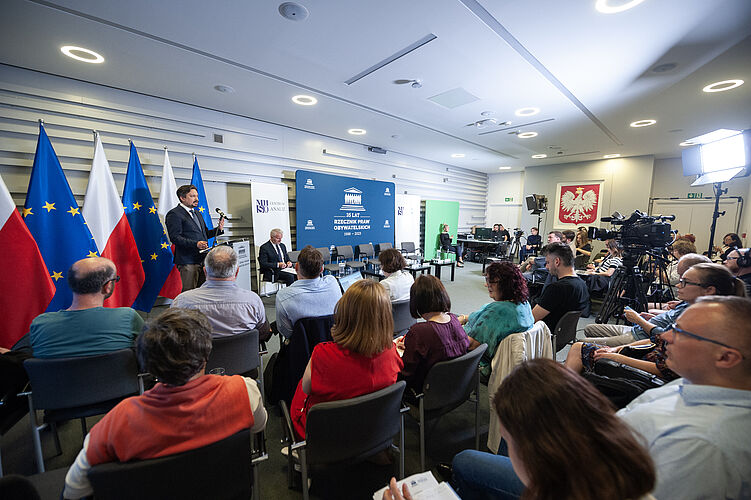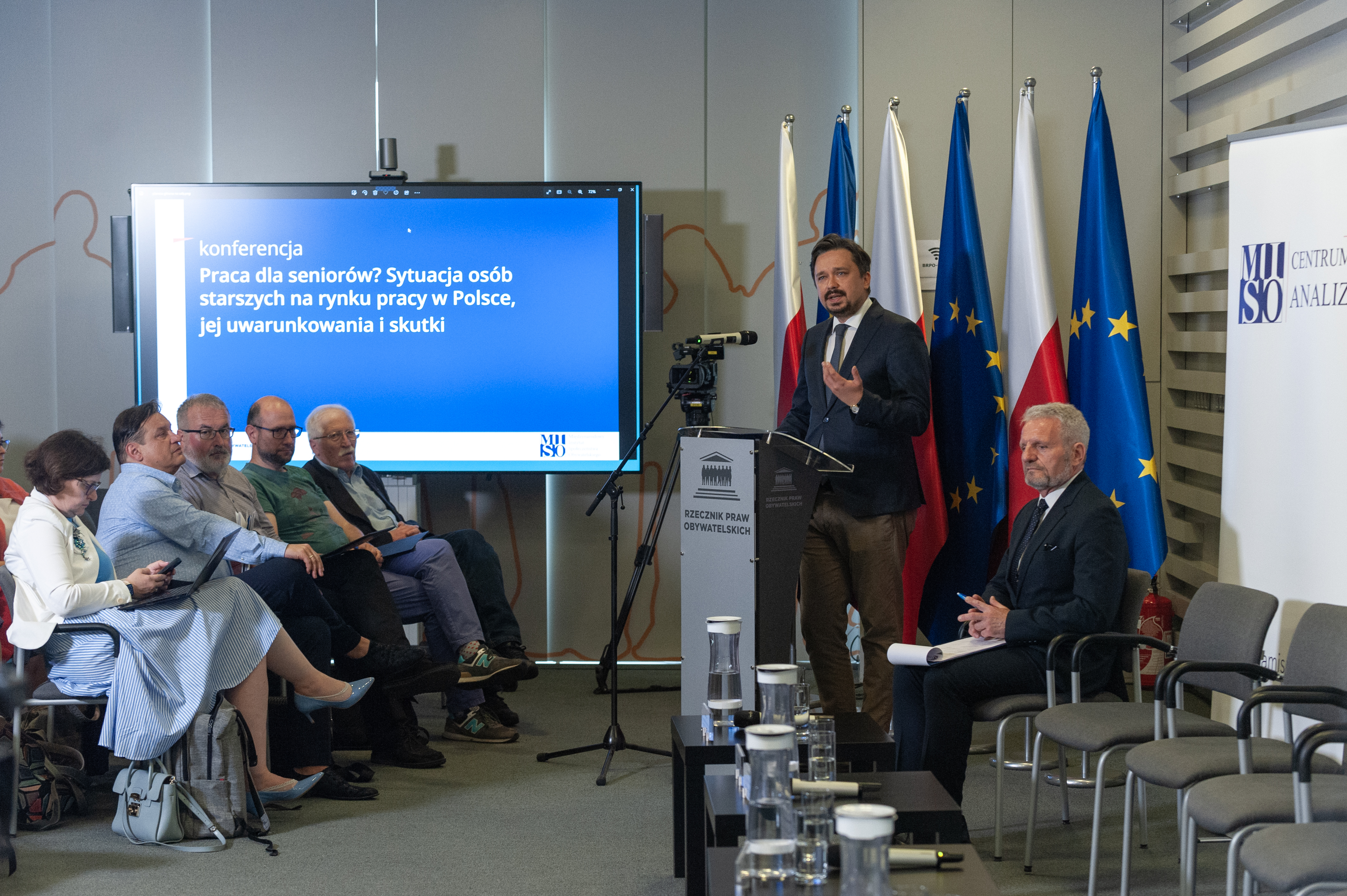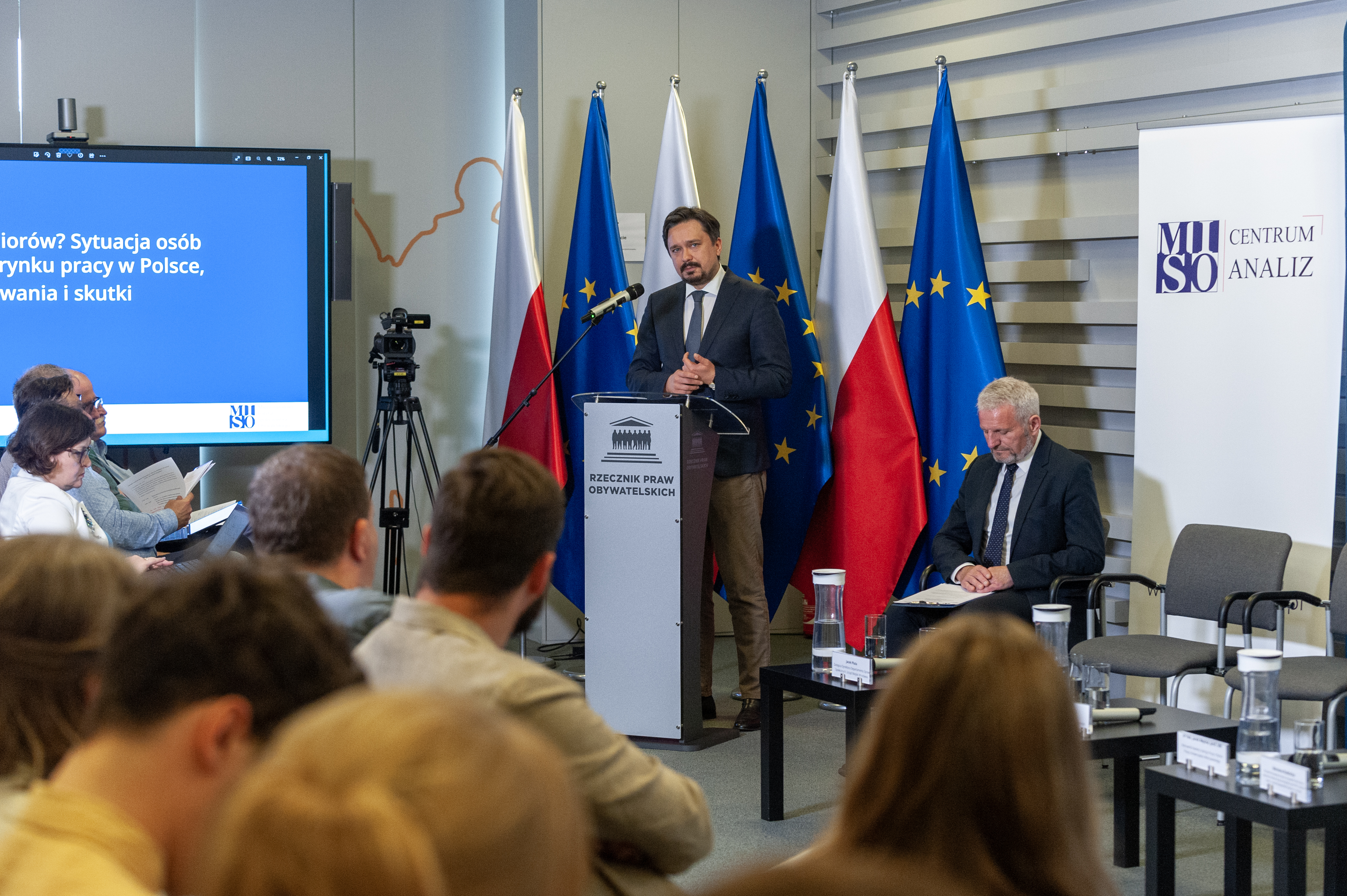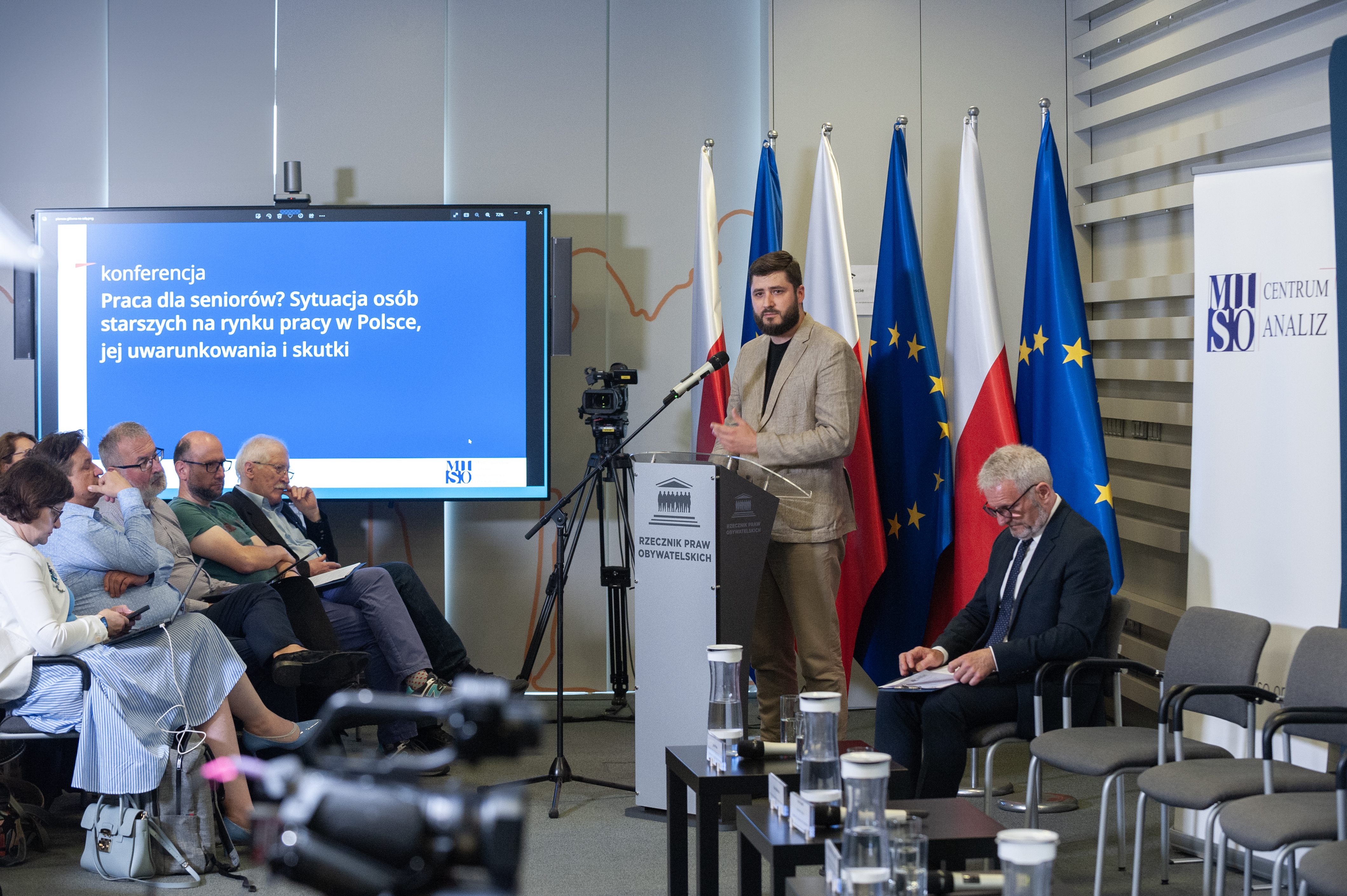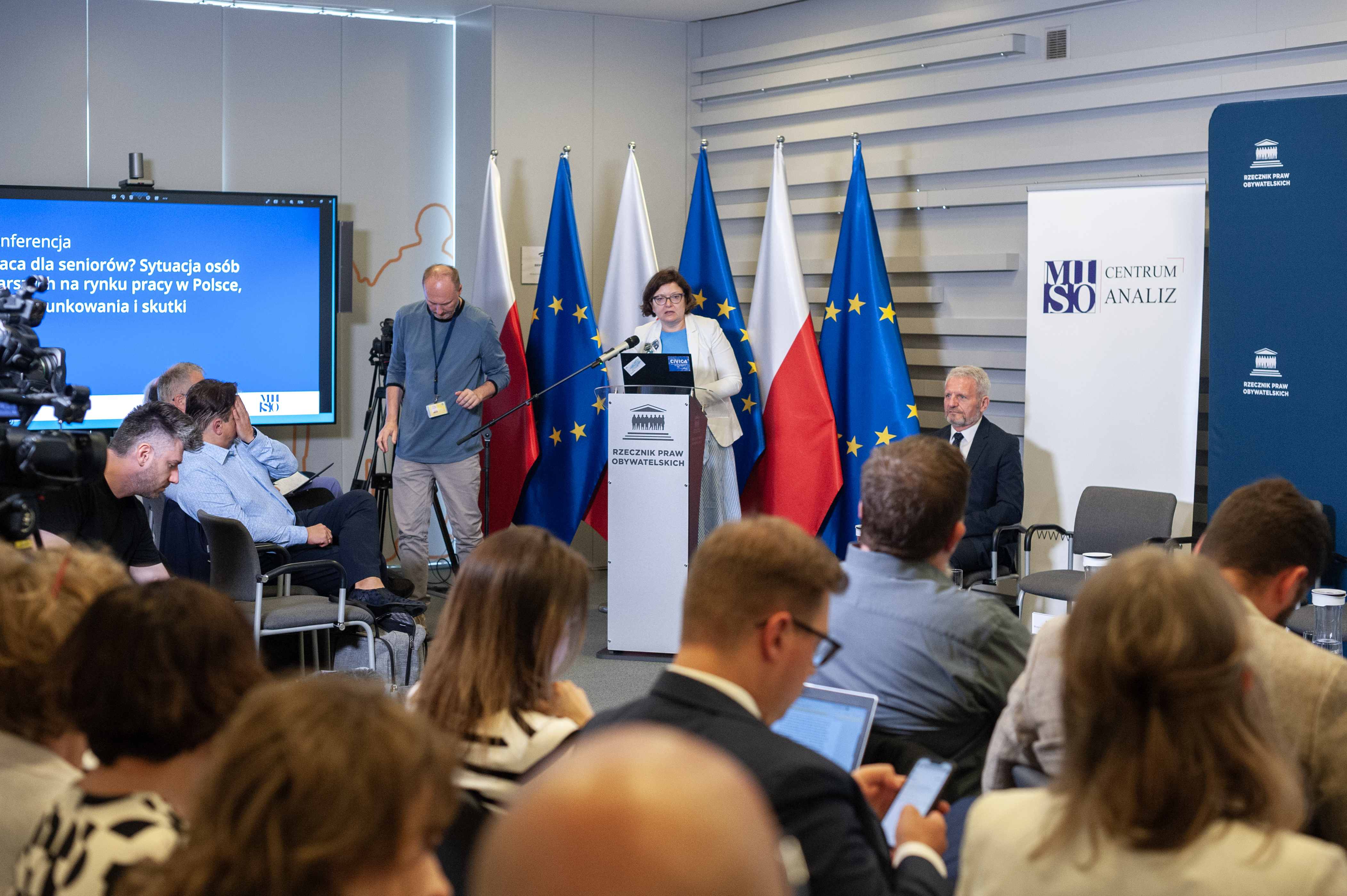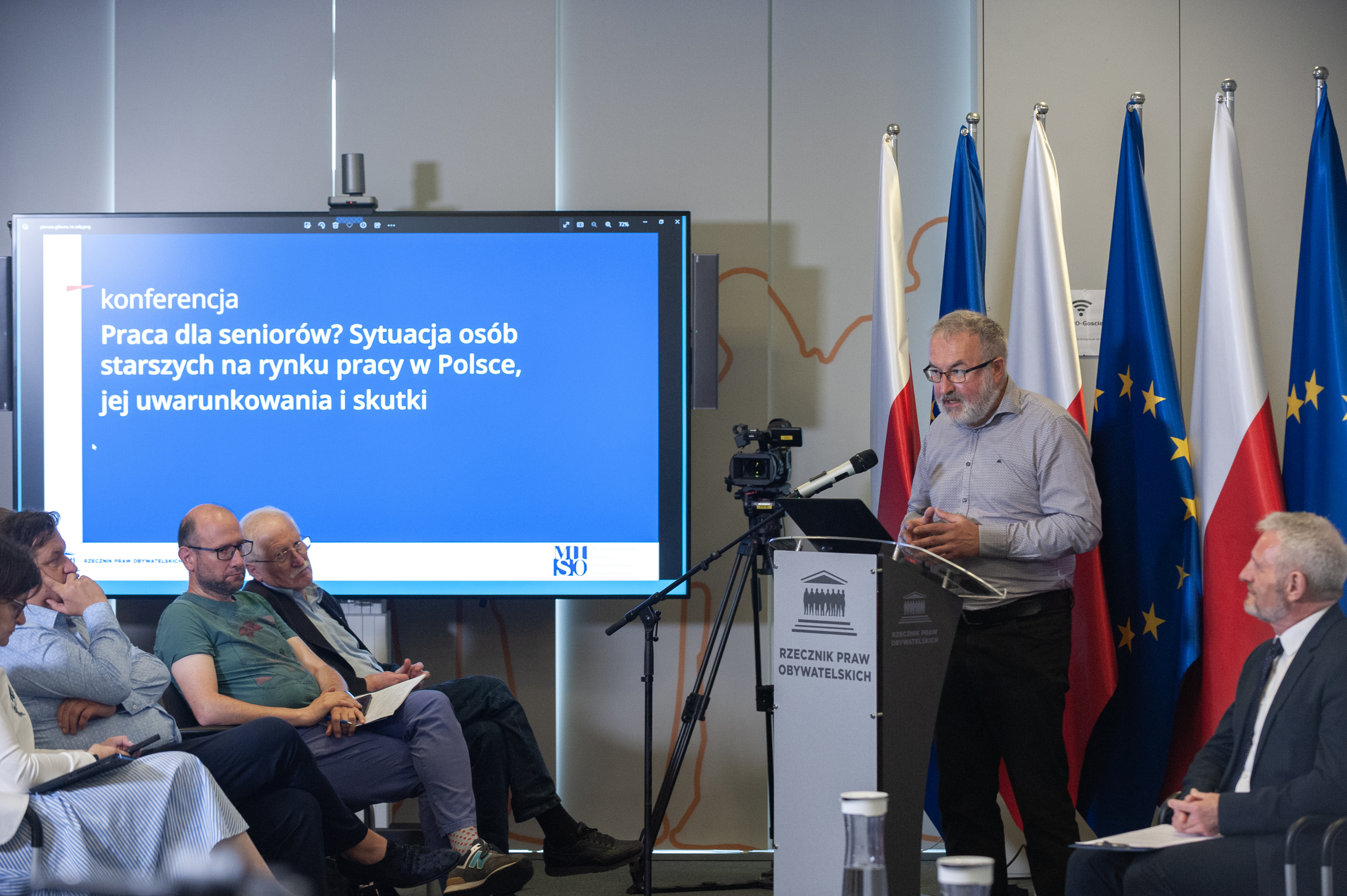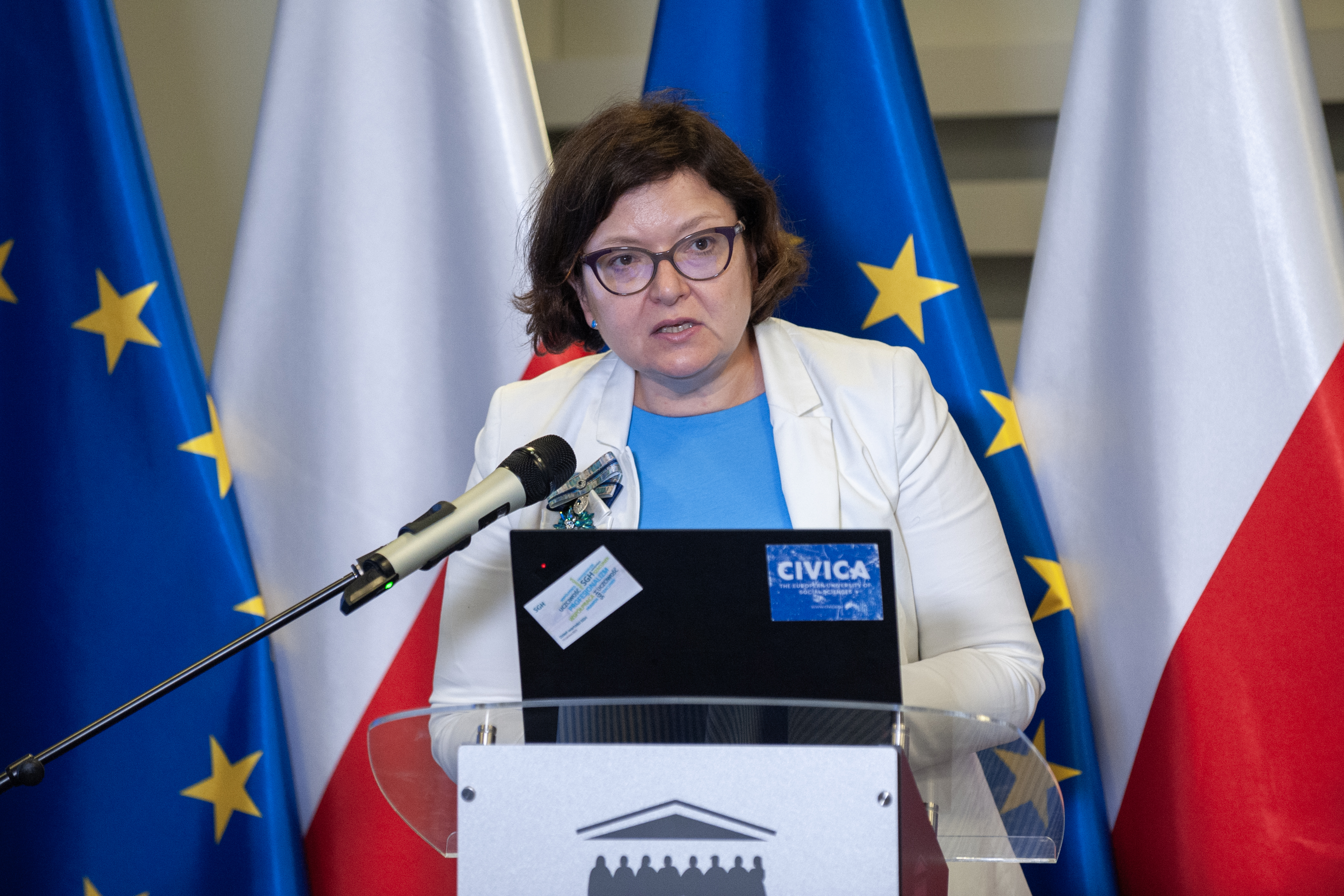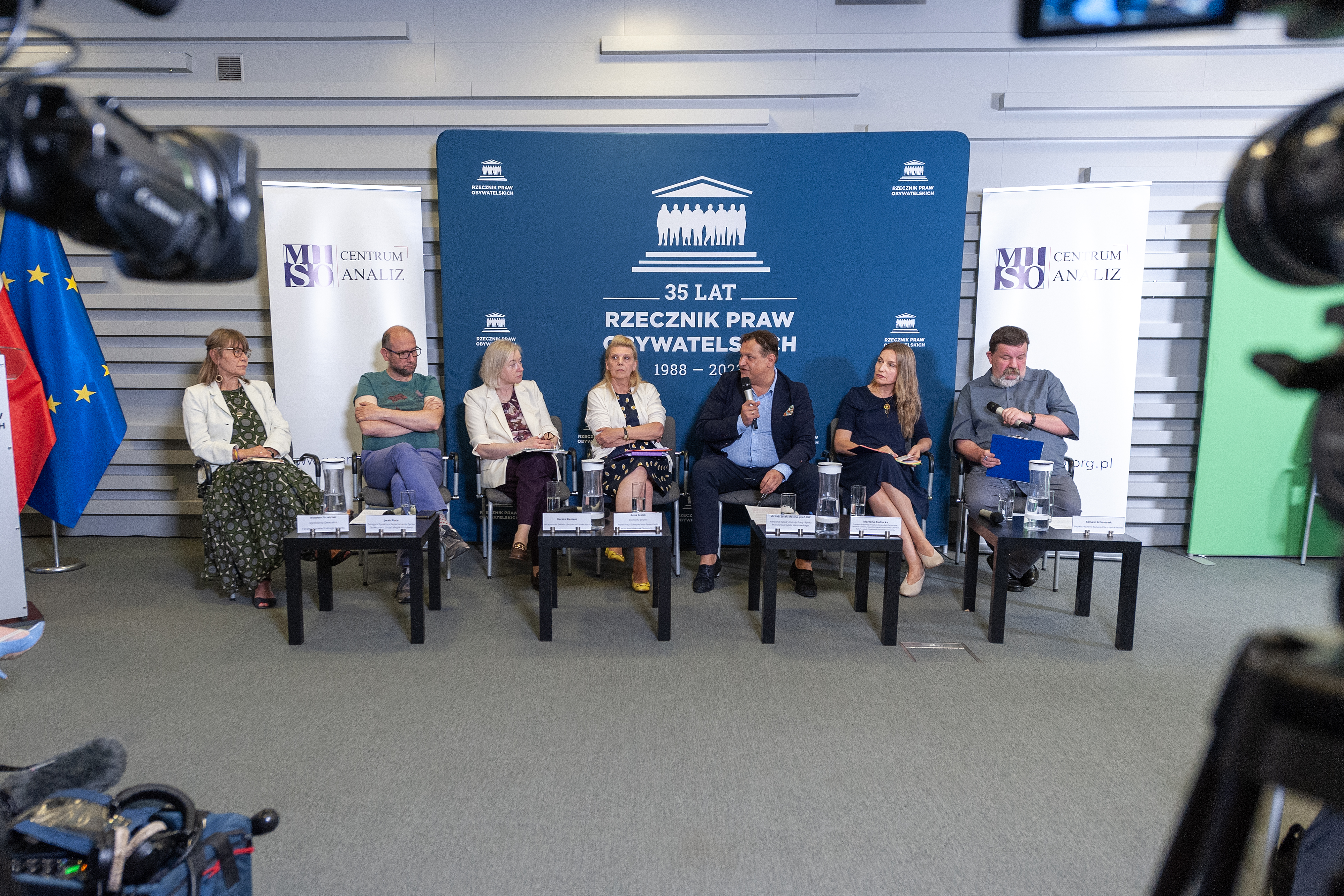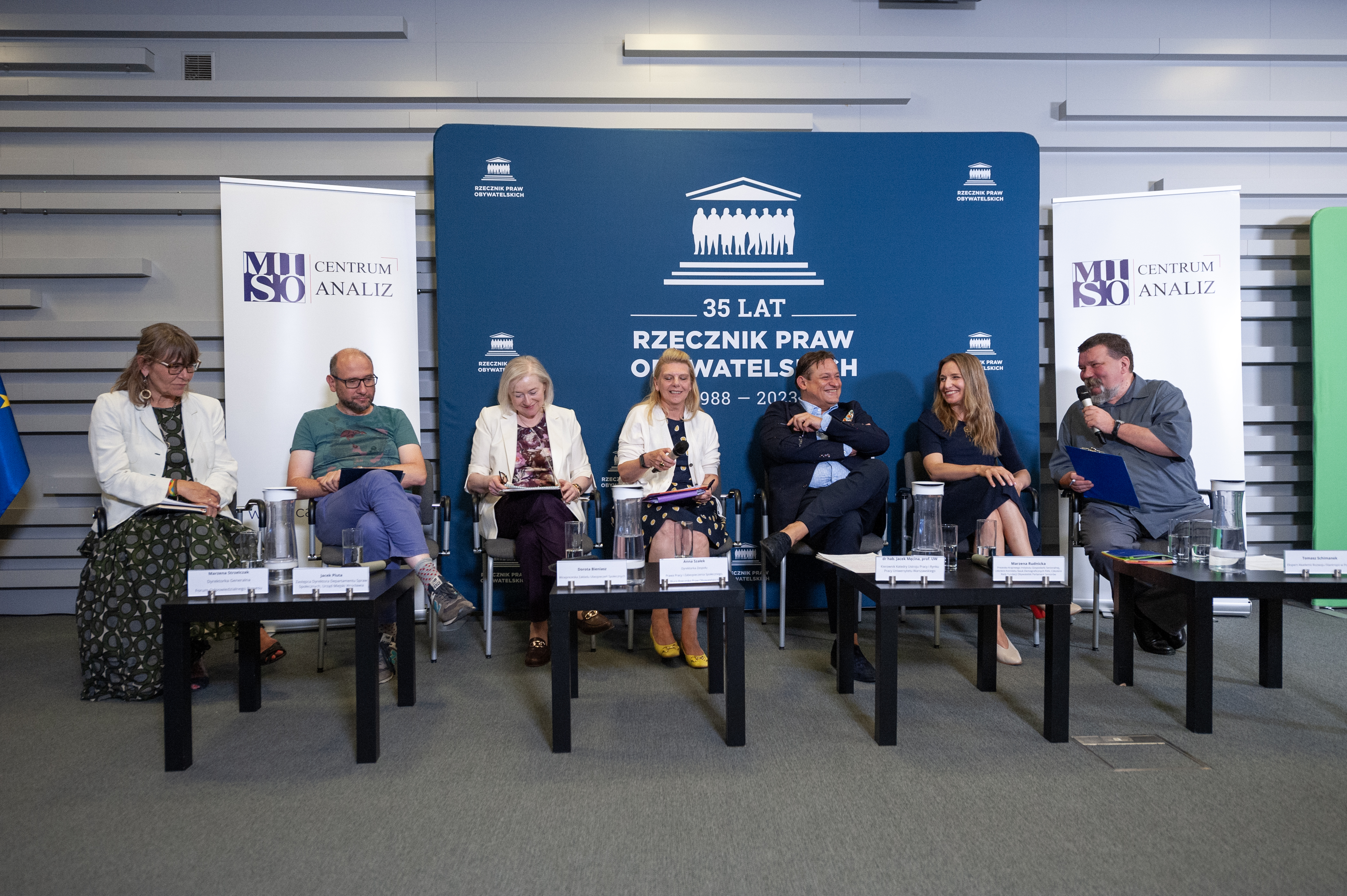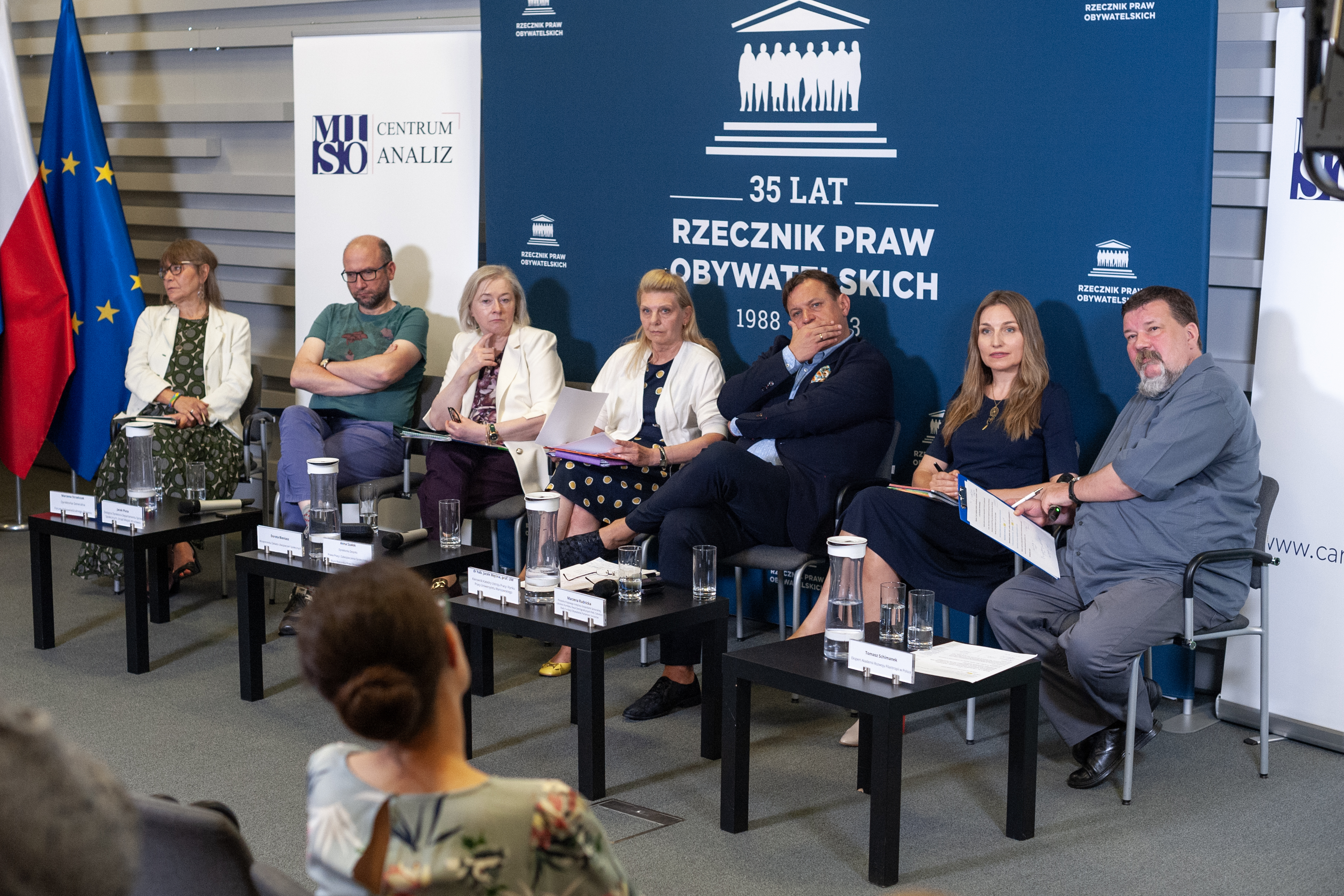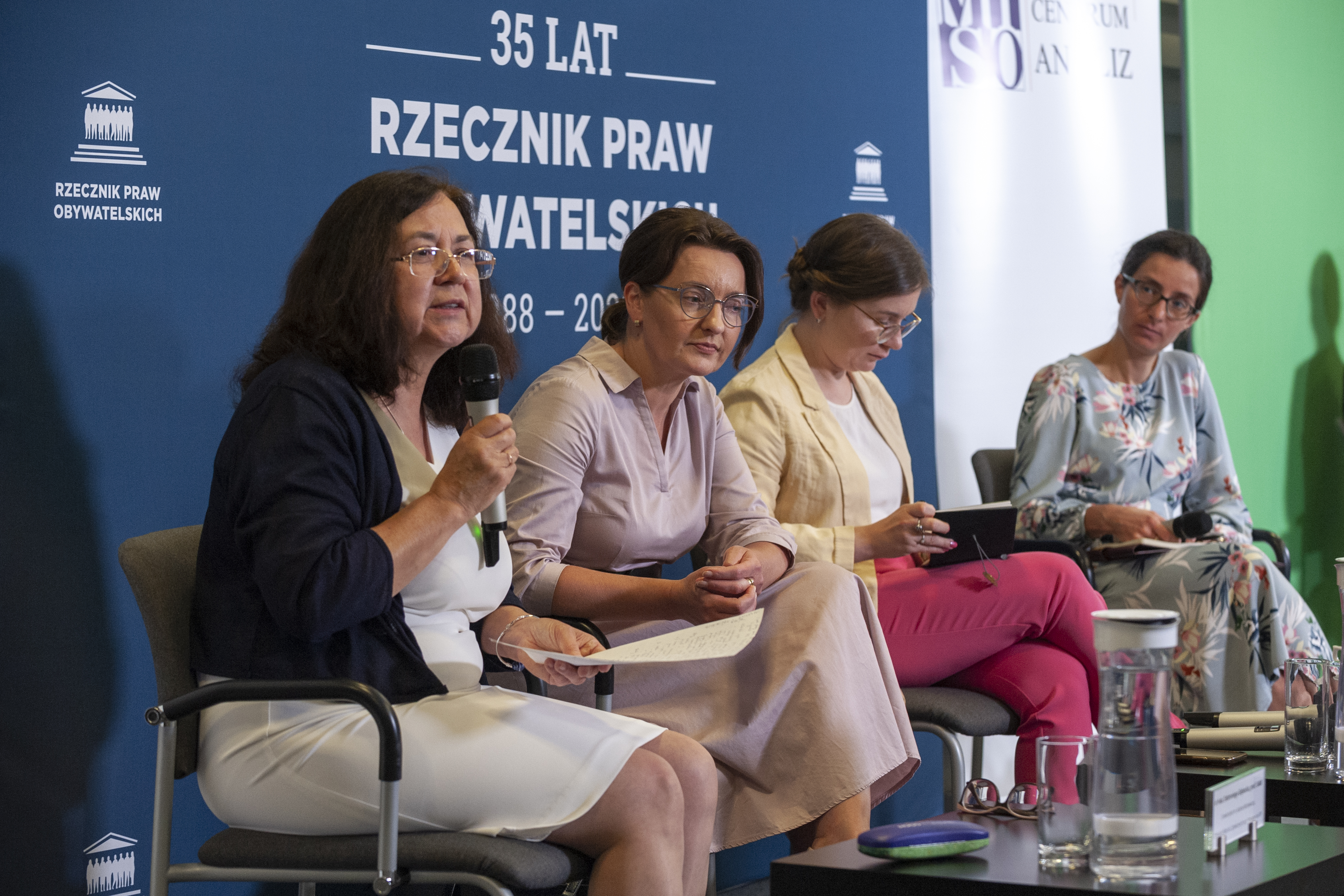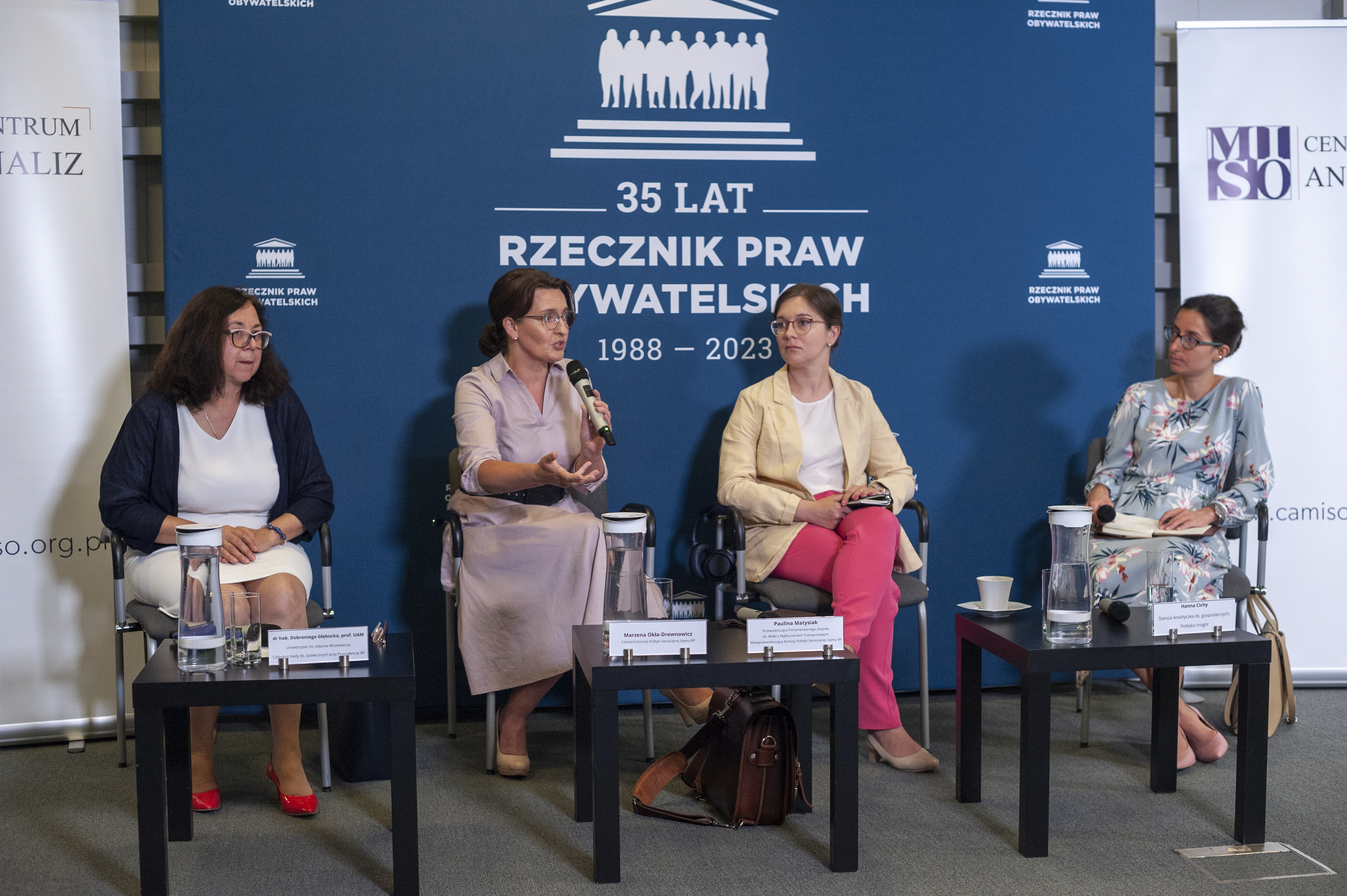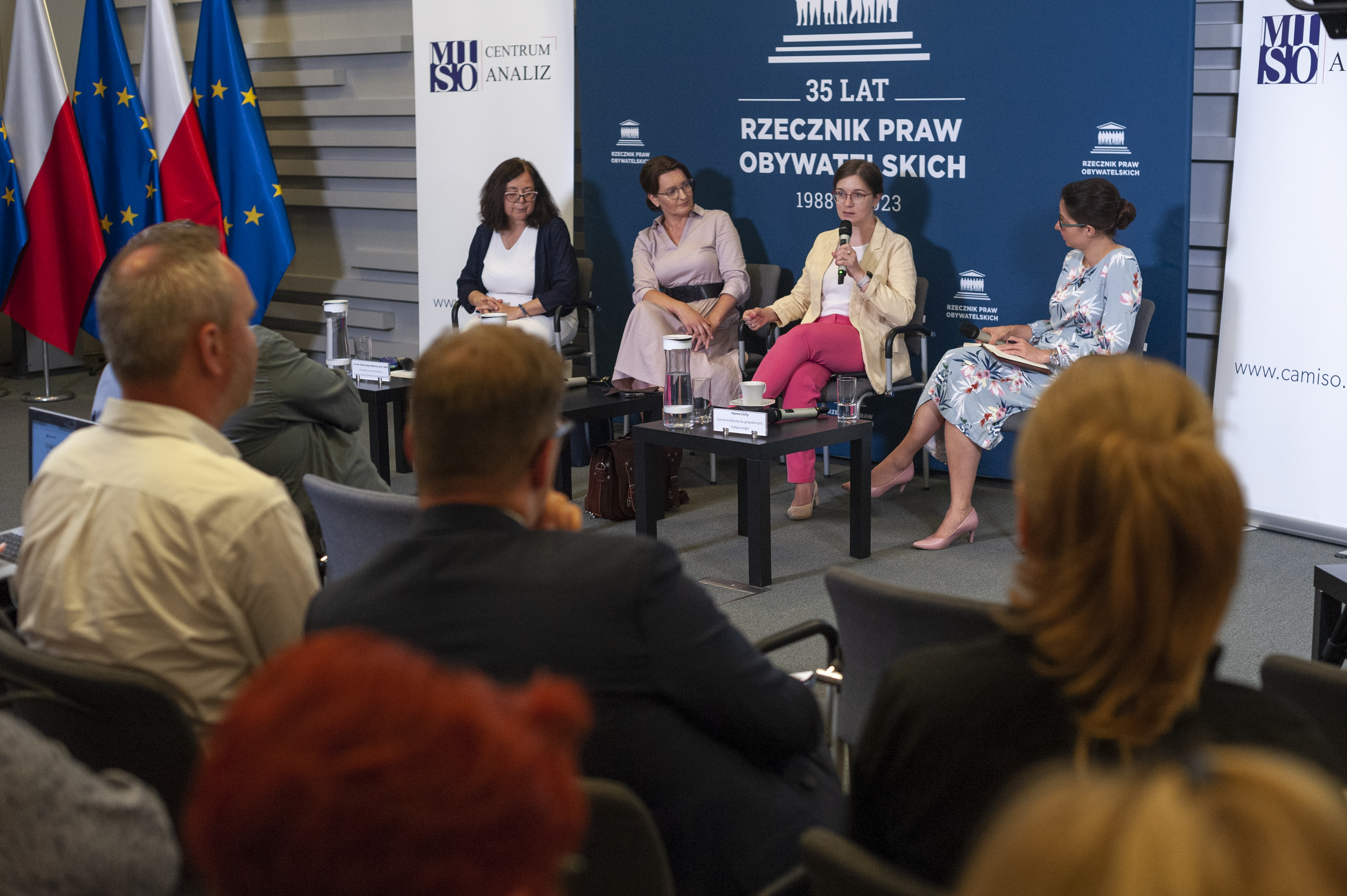LABOUR CONGRESS. JOBS FOR SENIORS? THE SITUATION OF OLDER PEOPLE IN THE LABOUR MARKET IN POLAND, ITS CONDITIONS AND EFFECTS
The participants in the event, which was organised by the Commissioner for Human Rights and the International Institute of Civil Society leaned into the characteristics of the Polish labour market for older people and the direction of change it should take.
Opening the conference, Marcin Wiącek, the Commissioner for Human Rights, emphasised that every citizen, regardless of age, has the right to work, freedom of employment, choice of profession and place of work. This is guaranteed by the Polish Constitution and the Labour Code.
- In the case of the elderly, this is of particular importance, as work is not only a source of income for them, but also a confirmation of their usefulness to society, a source of satisfaction, a way of counteracting social isolation - the Commissioner said, and pointed out that work and lifelong learning contribute to a person's continuous development and maintenance of their physical and mental well-being.
- Unfortunately, older people are often perceived as a group in opposition to development, youth, attractiveness, health or vigour. A negative image of old age prevails, being associated with infirmity, unproductivity, loneliness, neglect and often poverty" - the Commissioner said.
As he pointed out - it can cause older people themselves to lack confidence in their own abilities and career development. Lack of self-confidence and fear of change, in turn, influence lower professional activity, reluctance and resignation to look for a job. He added that older people are also less interested in starting their own businesses.
- These are very unfair stereotypes referring to older people. And today, we are meeting, among other things, to fight and expose them" - Marcin Wiącek emphasised, adding that the positive aspects of ageing are much less frequently recognised.
- The right to work at an older age depends on the possibility of realising other rights, including the right to healthcare, the right to education at an older age, the right to social inclusion, digital inclusion, countering ageism in the labour market, or negative stereotypes associated with ageing.
He recalled that in both Polish and EU law, age discrimination in the labour market is prohibited. - However, without an impact on other areas of life, these provisions often remain empty, ineffective.
The Commissioner spoke about ageism, which, according to the definition provided by the World Health Organisation, refers to stereotypes, i.e. ways of thinking, prejudices, perceptions and discrimination based on age. - Ageism also has its manifestations in the labour market, the Commissioner pointed out, noting that from his point of view, the key manifestations are institutional ageism, hidden in public policies and legislation.
He gave an example of support for the unemployed from the Employment and Counteracting Unemployment Act. - In the Act we have a definition of an unemployed person. It is a person who has not reached retirement age.
- Thus, according to the regulations, support under this law is not available to women at the age of 60 and men at the age of 65. - he explained, and pointed out that this is a testimony to the fact that reaching retirement age means that there is a de facto limitation in the ability to receive the support needed to remain in the labour market.
The second example identified by the Commissioner was the work on the draft law on personal assistance for persons with disabilities. In its current version, people of retirement age were excluded from personal assistance.
- One can see an implicit assumption here that, as understood by the authors of this project, the state's obligation to ensure the right to work does not extend to people of retirement age - he explained. - This means that the right to pension security actually excludes the state's obligation to support people in their search for a job - he added and stressed that this is discrimination that should be fought against.
- It cannot be that reaching retirement age exempts public authorities from their constitutional duty to counteract unemployment, to counteract exclusion in the labour market - Marcin Wiącek stressed.
He explained that key to solving such problems are changes in the law and social policies, such as the amendment of the Law on the Elderly of 2015, or the start of work on the next edition of social policy towards older people until 2030. Safety. Participation. Solidarity.
The Commissioner expressed his hope that the conference would contribute to better recognising constraints and seeking solutions to enable older people to more fully realise their right to decent work.
- This is very important, not only from the perspective of the freedom and dignity of seniors, but also from the perspective of society as a whole - he pointed out, adding that the ageing process means that society has to make even a better use of the capital inherent in seniors.
- I hope that the conclusions which will emerge from today's meeting will allow both the office of the Commissioner for Human Rights and non-governmental organisations to propose to the authorities and the society some postulates which will allow human dignity in Poland to be better protected, so that there is no age discrimination in all areas of social and economic life - he concluded his speech and wished the participants fruitful deliberations.
Welcoming the attendees and thanking the Commissioner, Mateusz Komorowski, MISO President, said that the foundation has for several years been raising the subject of work publicly. The Labour Congress is a permanent project for the exchange of views and knowledge about labour. At the root of the idea of work is the idea of solidarity, largely forgotten and in need of redefinition.
Since 2020, our initiatives have emphasised the social dimension of work, values, the importance of work for the smooth functioning of the state and the professional ethos of individual professions. But we also draw attention to the key problems of individual professional groups and try to put forward concrete ideas for positive solutions.
We ask what this new solidarity is supposed to be, whether it pays to work at all, how labour relations affect civil society, social capital and the quality of democracy, why we need dialogue, trade unions, NGOs and strong institutions. We also talk about women and their invisible work, where to look for hidden powers in the labour market, how the economy of law and the philosophy of work relate to each other - Mateusz Komorowski said.
Introductory speeches at the conference were delivered by Agnieszka Chłoń-Domińczak, former Deputy Minister of Labour and Social Policy, Vice-Chancellor for Science at the Warsaw School of Economics, and Director of the Institute of Statistics and Demography at the Warsaw School of Economics, and Piotr Szukalski, demographer and gerontologist, researcher in various aspects of ageing, author of many publications on older people.
Agnieszka Chłoń-Domińczak spoke about the situation of older people in the labour market in Poland. She discussed the SHARE 50+ survey, a study of health, population ageing and retirement processes in Europe, conducted among people aged 50 and over.
She pointed out factors encouraging or discouraging work, such as whether the work is physical, whether there is time pressure at work, whether there are opportunities for promotion, whether there is job security, as well as development opportunities, whether the employer provides support and whether the employee is paid adequately.
- Surveys show that Poles are mainly dissatisfied with salary, opportunities for promotion and development. They also talk about hard physical work - she explained.
In her paper, she also discussed the results of a survey on the age of retirement. She pointed out that in Poland, those who declare to retire quickly are about 58% men and 44% women. She also spoke about the labour market for people 50+ in Poland during the COVID-19 pandemic. She pointed out that, due to the pandemic, some people retired earlier than intended, and remote working among people 50+ was not as popular as in other European countries. - 90% of Polish men and women aged 50+ declared that they felt very safe at work during the pandemic - she added.
In conclusion, she drew attention to the main arguments that need to be raised when discussing the labour market of people 50+ in Poland. They concern extending and maintaining the economic activity of people at the pre-retirement age. She pointed out that there is a very large group of people who are dissatisfied and discouraged with work due to low chances of promotion, hard physical work, less freedom in organising work or a feeling of inadequacy of wages.
Piotr Szukalski delivered a paper on the determinants and consequences of work for older people. He presented a model view on factors determining the level of work activity of senior citizens. These include career history, amount of alternative income, health status, value system, family responsibilities (especially in the case of women this is a heavy burden).
But it also depends on the employer's willingness to continue employment and new challenges or the organisational culture. Finally, it is the local labour market situation, the wage gap and access to care services. And lastly, it is also labour market policy, pension and healthcare systems.
The consequences of remaining in the labour market are not only negative. Those who work take more care of their health, although we also have to deal with many work-related ailments. There is also competition for family life, and by working longer, we are a better contributor to local government. Then there are also higher taxes, and eventually the country's GDP is also higher.
Poland's economic structure is changing. There will be industries where it will be easier to stay in work. But staying in work will also be crucial for certain industries, e.g. in the public sector 40 per cent of employees are over 50, with a surplus of women. Encouraging people to stay in work may therefore be the only sensible solution in the medium term, as new employees in this industry need to be educated, which takes time and costs money.
Panel discussion: what are the factors influencing the employment of older people in Poland?
The first panel on the employment of older people was moderated by Tomasz Schimanek, an expert from the Academy for the Development of Philanthropy in Poland and a member of the CHR’s Expert Committee on Older Persons.
Tomasz Schimanek said that it is not clear in which ministry the work is to be found today, as we now have the Ministry of Family and Social Policy. And the jobs are right there. This is symptomatic of the state's approach. He asked the panellists what, from an experiential perspective, influences employment, what are the most important drivers and constraints of employment for seniors. He also asked about recommendations that could improve the employment situation for older people.
Dorota Bieniasz, Vice-President of the Social Insurance Institution, pointed out that staying in the labour market is mainly influenced by the desire to maintain income at the level of the salary received. This is also facilitated by maintaining good health and a sense of satisfaction and good relations at work, as well as the absence of obligations towards the family. She also pointed out that 70% of people who reach retirement age retire and a further 10% retire in the next 12 months.
- The fact that people leave their jobs is mainly influenced by a sense of job burnout, physical and mental workload - she said, adding that many seniors raise the issue of the difficulty of adapting to modern technology, digitalisation and electronification in workplaces.
Speaking about recommendations from the point of view of benefit recipients, she pointed out, among other things, that within the framework of education the knowledge should be disseminated so that people around retirement age are aware of how they increase their benefit when they work longer. She also explained the reason for the low pensions of people in the new pension system, pointing to their short length of service and period of contributions.
Jacek Męcina, Head of the Chair of the Labour System and Labour Market at the University of Warsaw, an expert on labour law and labour relations and employment policy, former Deputy Minister of Labour and Social Policy, advisor to the Management Board of the Lewiatan Confederation, pointed out that people 50+ are no longer digitally excluded and consciously look at their professional career. In the perspective of a decade, half of our labour resources will be 50+ people. So, we need to have a more individualised approach - a different one for the scientist, the engineer and a different one for the manual worker. And let's keep in mind robotisation, although it will not quickly replace, for example, nurses.
He pointed out that when talking about the employment of older people, a distinction should be made between different approaches. One is to create conditions for prolonging labour force participation - here it is easier to achieve good results - and the other approach is to create mechanisms to encourage employers to employ older people.
Speaking about recommendations, he pointed to changes in labour law and, to a greater extent, the establishment of certain industry and company solutions affecting ergonomics and work organisation. He also drew attention to modern fiscal instruments that should encourage the employment of older people and pointed to ready-made solutions from, for example, Scandinavian countries. The third sphere concerns workplace relationships and an intergenerational dialogue.
Jacek Pluta, deputy director of the Department of Social Affairs at Wrocław City Hall, said that in order to combat stereotypes, the term "senior citizens" should be removed from the language. He talked a lot about the experience of Wrocław, where more than 40,000 jobs had been created for refugees from Ukraine. He advocated equalising the retirement age between men and women.
Marzena Rudnicka, President of the National Institute of Senior Economy and a member of the Committee on Demographic Sciences of the Polish Academy of Sciences, pointed out that work teams should be diverse in terms of age, as this pays off both for employees and businesses; such teams are more efficient. There are industries where different expectations of different age groups clash, making cooperation impossible.
Speaking about recommendations, she pointed to campaigns to publicise the fact of age diversity in the labour market that should speak the language of benefits for business. She pointed out the six steps of age diversity management, namely:
1) spreading awareness of the fact of diversity.
2) recruitment.
3) ergonomics and the adaptation of workstations.
4) equal access to promotions, but also to internal and external projects, often development projects to gain new competences, and to internship programmes.
5) equal right to remuneration regardless of age.
6) preparing for retirement.
Marzena Strzelczak, Director General of the Responsible Business Forum, encouraged to stop looking at the 50 plus employee group in a stereotypical manner. - It is said that 50 plus people have digital problems, but not of bigger scale than 40 plus people. Research has shown that in the finance sector, 50 plus people are very open to change. Age discrimination is still there, albeit hidden. We need to act together to change the law. Education, education and more education, including anti-discrimination education - she stressed.
Anna Szałek, Director of the Labour and Social Security Law Team, presented the perspective of the Commissioner for Human Rights. She pointed out that the above-mentioned issues do not translate into the number of complaints sent to the Commissioner for Human Rights regarding age discrimination. - In 2023, the Labour and Social Security Law Team had received a total of more than 1,100 cases by the end of May. Of these, 18 cases related to employment discrimination - she pointed out and added that similar proportions had been observed in previous years.
Analysis of the complaints shows that age discrimination starts already at the recruitment stage. Differentiation also applies to pay or the selection of an employee for dismissal. The complainants also point to employers' protective measures such as differentiating working conditions. The most frequent issue resolved in the case law is the problem of the legality of terminating an employee's employment contract due to reaching the retirement age. Complaints also point to the problems of different retirement ages for men and women.
She drew attention to the need to conduct a discussion about a retirement age and to consider whether the retirement age was of an appropriate level given the economic and demographic situation. The second issue is to responsibly design social care for the elderly and to implement solutions that will ensure a dignified, secure and active old age. The last recommendation is to educate and dispel stereotypes and transfer knowledge between generations.
Panel discussion: What legislative changes are needed to increase and facilitate the employment of older people.
The participants of the next panel discussion considered the issues of what legislative changes are needed to increase and facilitate the employment of older people. Is it possible to achieve in Poland the same level of employment as in Estonia or Sweden? And if so, how to go about it?
The discussion was moderated by Hanna Cichy, Senior Economic Analyst, Policy Insight, who asked the participants, among other things, who should be responsible for the education and training of older people and how the creation and coordination of social services could be improved.
The panel discussion included Paulina Matysiak, local government official and political activist, Chair of the Parliamentary Group for Combating Transport Exclusion, MP for the 9th Sejm term, Vice-Chair of the Sejm Senior Policy Committee, Marzena Okła-Drewnowicz, politician, local government and social activist, MP for the 6th, 7th, 8th and 9th Sejm terms, member of the Sejm Senior Policy Committee, and Dobroniega Głębocka, sociologist, Adam Mickiewicz University in Poznań, member of the Social Affairs Council to the President of the Republic of Poland.
The participants touched on the impact of the welfare system on the employment of older people. They pointed out the inadequacies of this system and the need to deepen the coordination of multiple actors - government, local governments and the third sector and business. Social Service Centres are also a good solution as a place to coordinate services and tailer them to individual, citizens-oriented needs. It was pointed out that actions are forced by the labour market. However, the whole process must be strategically supervised by the government, which must know in which professions there will be a deficit, what the labour market situation will be, how to direct the flow of money from the EU. Education will be important. In the discussion, it was also pointed out, among other things, that the elderly cannot be viewed solely as people who need to be cared for or given additional support.
The conference was interpreted into the Polish sign language and broadcast on the internet.
photo: Grzegorz Krzyżewski/CHRoffice


